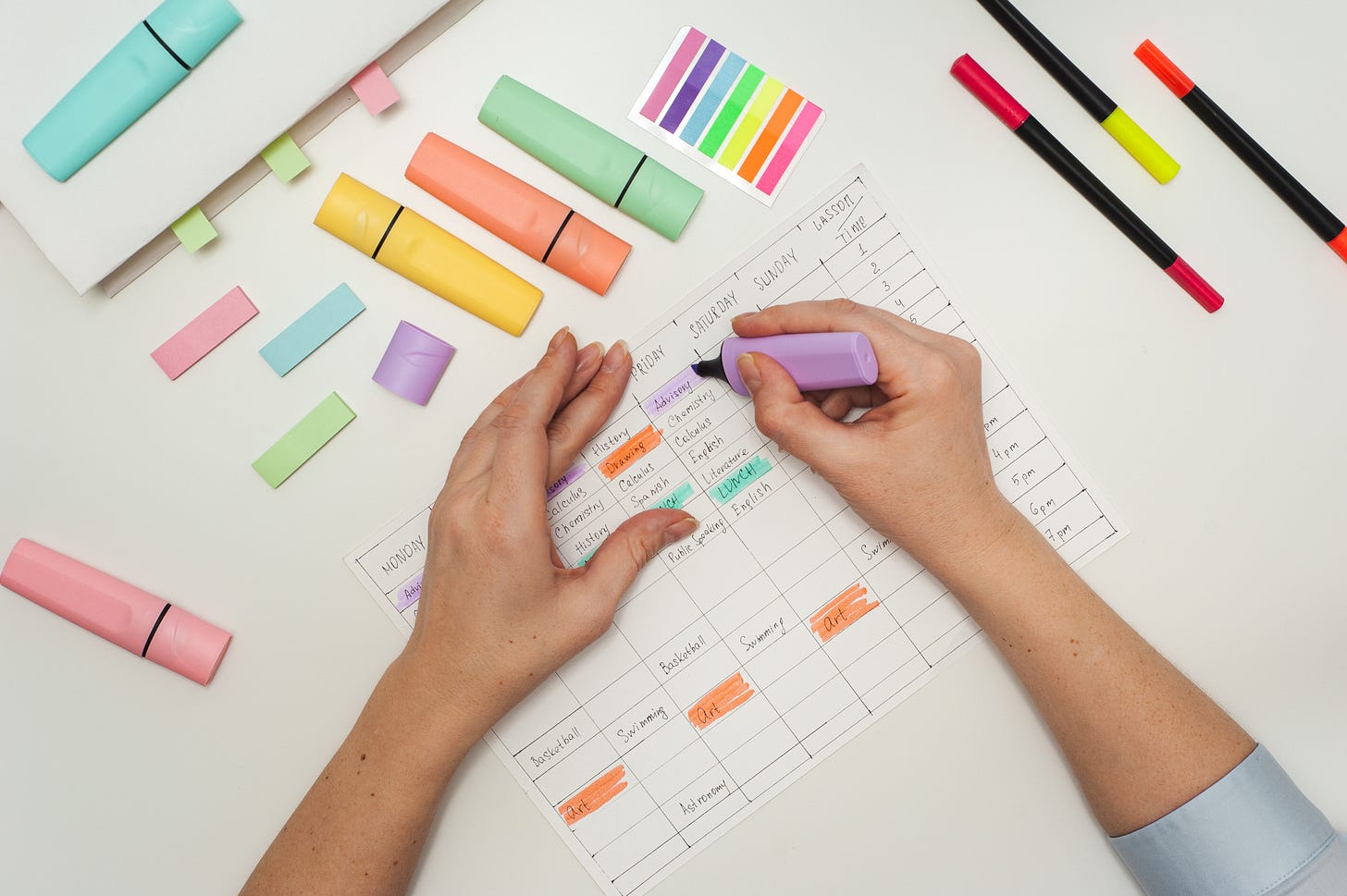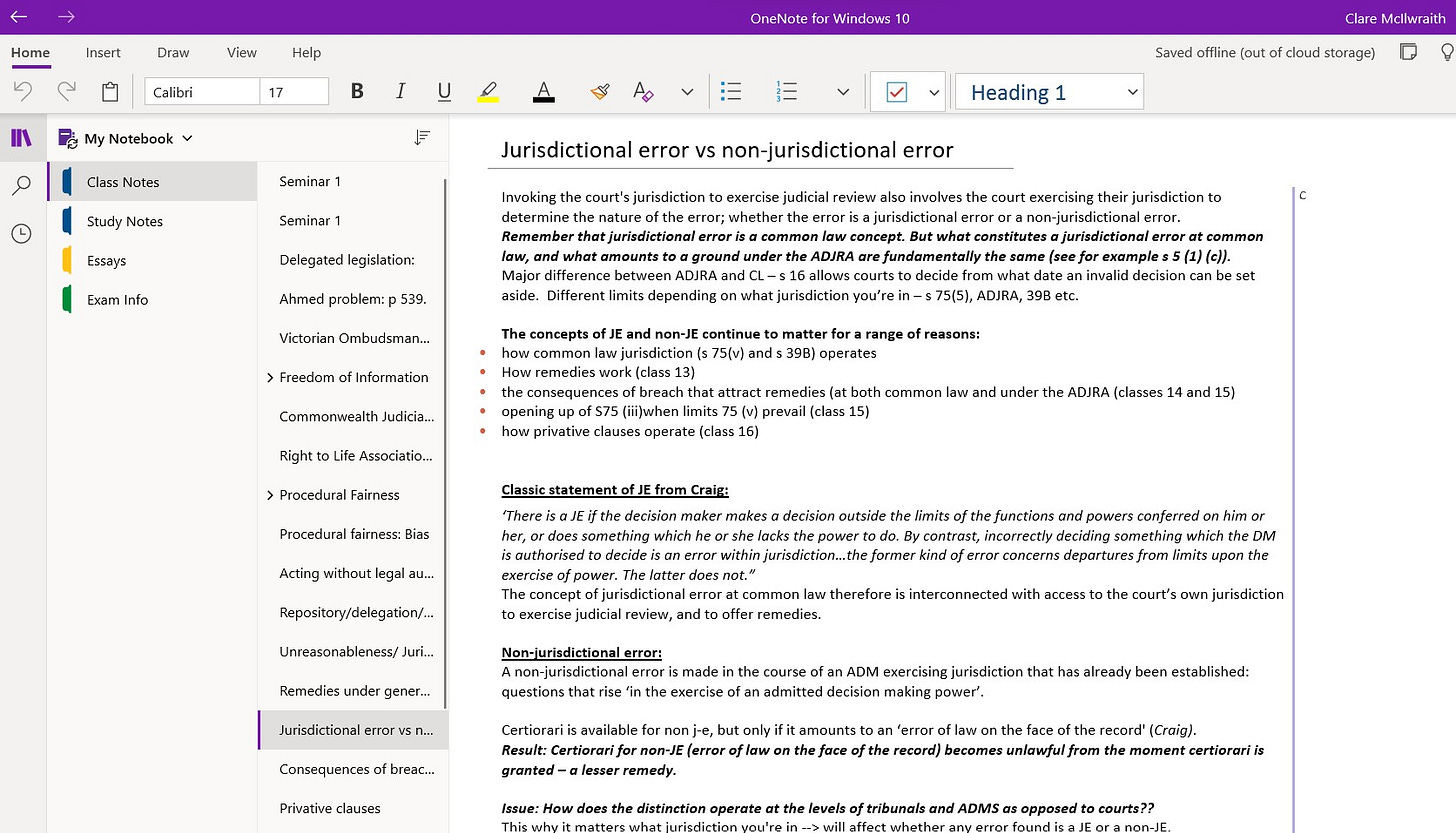January is Organisation Month at Cram Lab
Let's get your teen organised for 2024
Hey everyone,
I’m going to try something new this year and focus on a different key element of studying each month.
This way, we can develop your teen’s Study System over the course of the year, and have them as ready as possible for their exams later on.
First up is Organisation.
Getting organised seems like a logical place to start in January. Getting organised makes the rest of studying so much more efficient and less stressful.
To kick things off here are 5 tips, resources and previous posts you can share with your teen to help them get super duper organised this year.
1. Help Your Teen Make a Weekly Timetable
If studying / homework isn’t planned in advance, it’s much less likely to happen.
If your teen is struggling to get motivated, to get started, and generally feels overwhelmed by doing homework and making a start on studying, I cannot overstate the benefits of a simple weekly timetable.
All it needs to do is allocate a few hours a week to completing homework, assignments, and enough study to keep on top of what’s going on at school.
I think a lot of teens feel like they need to study for hours and hours to get good results, which feels overwhelming so they don’t even try.
But that’s not the case.
Studying is like that Atomic Habits concept — small amounts of effort over the course of the year compound to achieve great results.
And when studying is planned for in advance, it makes your teen more accountable, and therefore more likely to actually do it.
2. Make sure they have a system for taking notes in class
Keeping on top of what’s going on in class is KEY for making studying for exams a million times easier.
Whereas if your teen starts their exam study later on in the year on the back foot, they have to spend time teaching themselves everything before they can even start getting stuck in to proper exam study. That is a nightmare situation.
My favourite options for taking notes in class are:
A good ol’ exercise book and a pen. There’s something so powerful about the kinaesthetic process of writing that seems to help form stronger connections about what we’re learning than typing on a laptop or tablet. Plus writing notes in an exercise book keeps everything nice and safe in once place.
For PC users, OneNote makes it very easy to keep well organised notes. I used it all through law school. Evernote is great for Mac and PC users. Whatever note-taking software your teen ends up using, the key is that they organise their notes within the program in such a way that makes them easy to navigate once exam study rolls around.
Sometimes, not taking many notes at all. If your teen is trying to write down everything their teachers say verbatim, they’re probably not listening and not trying to actually understand what’s being taught. It can be better to just sit and listen, and take a few notes to summarise the lesson that can be referred to later when your teen goes over what happened in class.
3. Mark important dates in the calendar now
Exams have a nasty habit of sneaking up on a lot of teens. Planning is a skill that most of us don’t get sorted until adulthood, and yet we’re surprised and frustrated when teenagers don’t stick to a schedule.
But you can help your teen by gently reminding them when their mock exams and real exams are. When your teen should start studying for exams depends on how prepared (or not) they are, but as a rule of thumb teens should be at least thinking about studying about six weeks out from exams, especially for senior exams.
4. Have a look at my previous posts about organisation
Click on the box below for for all of my previous posts about organisation in one place. There is an absolute GOLD MINE of info in there, so I strongly recommend you take a moment to have a look at the ones that are most relevant to your teen’s organisation woes.
Motivation & Organisation Posts
Hi there, Below are all of my posts that cover motivation and/or organisation. There’s not a lot of point in me trying to help your teen with study skills if they have no motivation or are completely disorganised, so these posts are a great place to start if you are battling with your teen to get them over to their study desk.
5. Wield the power of incentives
Incentives can be a very powerful organisation tool and motivator.
Some teens benefit from having something to look forward to at the weekend as a reward for putting in the effort during the week. It could be going to a movie, making a dessert of their choosing on Saturday night, or just chilling out and doing nothing for a bit.
Long-term incentives are important too. What’s the big picture for your teen? What are they looking forward to after high school? Not necessarily easily answered but important to think about all the same…
Whatever it is, the important thing about incentives is making sure they are based on the effort put in, rather than a result. Your teen cannot fully control what grades and results they get, but they can control whether or not they stick to their weekly study schedule.
So, to chew over with your teen this week — what type of incentives would help them stay organised and motivated?
Is organisation one of your teen’s study downfalls? What in particular do they struggle with? Let’s talk it out in the comments.
Thanks so much for reading.
Clare x





